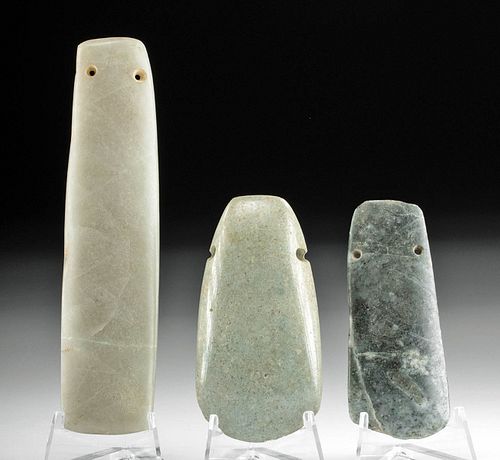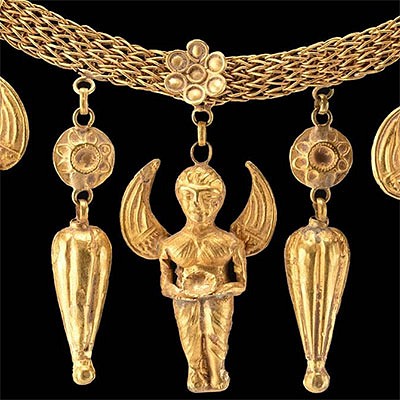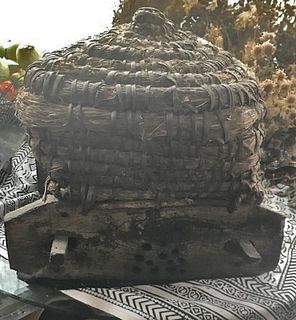Lot of 3 Costa Rican Jade & Greenstone Celts
Lot 114b
About Seller
Artemis Gallery
686 S Taylor Ave, Ste 106
Louisville, CO 80027
United States
Selling antiquities, ancient and ethnographic art online since 1993, Artemis Gallery specializes in Classical Antiquities (Egyptian, Greek, Roman, Near Eastern), Asian, Pre-Columbian, African / Tribal / Oceanographic art. Our extensive inventory includes pottery, stone, metal, wood, glass and textil...Read more
Estimate:
$2,000 - $3,000
Absentee vs Live bid
Two ways to bid:
- Leave a max absentee bid and the platform will bid on your behalf up to your maximum bid during the live auction.
- Bid live during the auction and your bids will be submitted real-time to the auctioneer.
Bid Increments
| Price | Bid Increment |
|---|---|
| $0 | $25 |
| $300 | $50 |
| $1,000 | $100 |
| $2,000 | $250 |
| $5,000 | $500 |
| $10,000 | $1,000 |
| $20,000 | $2,500 |
| $50,000 | $5,000 |
| $100,000 | $10,000 |
| $200,000 | $20,000 |
About Auction
By Artemis Gallery
Dec 3, 2020
Set Reminder
2020-12-03 10:00:00
2020-12-03 10:00:00
America/New_York
Bidsquare
Bidsquare : Fine Antiquities, Ethnographic & Fine Art
https://www.bidsquare.com/auctions/artemis-gallery/fine-antiquities-ethnographic-fine-art-6119
Features classical antiquities, ancient and ethnographic art from cultures encompassing the globe. Egyptian, Greek, Roman, Etruscan, Near Eastern, Asian, Pre-Columbian, Native American, African / Tribal, Oceanic, Spanish Colonial, Russian, Fine Art, so much more! All legally acquired, legal to sell. Artemis Gallery info@artemisgallery.com
Features classical antiquities, ancient and ethnographic art from cultures encompassing the globe. Egyptian, Greek, Roman, Etruscan, Near Eastern, Asian, Pre-Columbian, Native American, African / Tribal, Oceanic, Spanish Colonial, Russian, Fine Art, so much more! All legally acquired, legal to sell. Artemis Gallery info@artemisgallery.com
- Lot Description
Pre-Columbian, Central America, Costa Rica, ca. 200 to 800 CE. A wonderful trio of hand-carved and meticulously polished celt pendants - the short light green example carved from jade and the others from greenstone - all smoothed and rounded on one side, presenting a groove on the other, and double perforations at their narrow end for suspension and/or attachment. What's more, the stones used to make these examples possess gorgeous hues ranging from seafoam to forest green. Celts, also known as hand axes, had meaning beyond weaponry, especially when made of jade. Lucite display stands for photography purposes only. Size of largest: 1.125" W x 4.9" H (2.9 cm x 12.4 cm)
The value of jade for people in ancient Central America lay in its symbolic power: perhaps its color was associated with water and vegetation; later, the Maya would place jade beads in the mouths of the dead. Many scholars have argued that the demand for jadeite contributed to the rise of long distance trading networks and to the rise of urban centers in ancient Mesoamerica. Jade would have come to Costa Rica in the form of axe-blades (celts) that would then be worked by local artisans into pendants like this one. The exoticism of stone that had traveled so far probably contributed to the value of these objects in ancient Costa Rica. By 800 CE, gold had replaced jade as the prestige material.
Provenance: ex Craig Hendrix collection, South Carolina, USA; ex Charles Craig Jr. collection, Costa Rica, acquired in the 1960s and 1970s
All items legal to buy/sell under U.S. Statute covering cultural patrimony Code 2600, CHAPTER 14, and are guaranteed to be as described or your money back.
A Certificate of Authenticity will accompany all winning bids.
We ship worldwide and handle all shipping in-house for your convenience.
#154116Largest repaired along the lower body, and smallest repaired along edge of one lower corner, with resurfacing and light adhesive residue along break lines; medium-sized item is intact and very good. All items have light abrasions and nicks to front, peripheries, edges, and verso, with light encrustations within some suspension holes. Great surface smoothness and light earthen deposits throughout.Condition
- Shipping Info
-
All shipping is handled in-house for your convenience. Your invoice from Artemis Gallery will include shipping calculation instructions. If in doubt, please inquire BEFORE bidding for estimated shipping costs for individual items.
-
- Buyer's Premium



 EUR
EUR CAD
CAD AUD
AUD GBP
GBP MXN
MXN HKD
HKD CNY
CNY MYR
MYR SEK
SEK SGD
SGD CHF
CHF THB
THB













